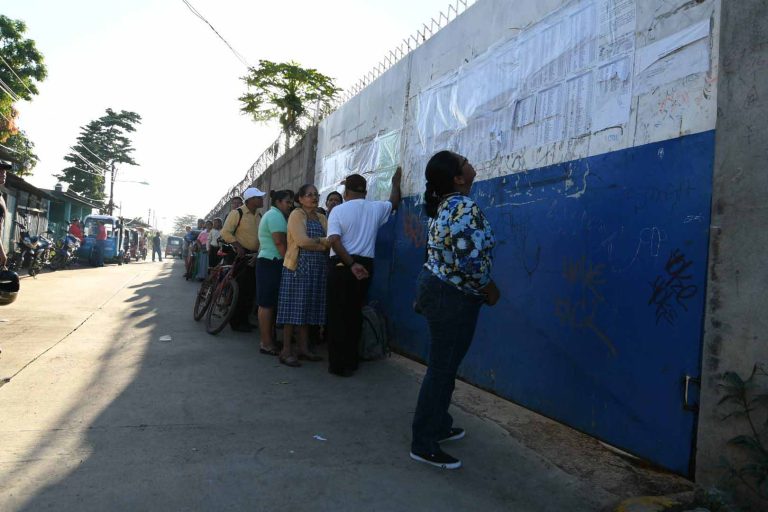23 de enero 2021

The Return of the Military

PUBLICIDAD 1M
PUBLICIDAD 4D
PUBLICIDAD 5D
Who ensures the conditions of the pre-electoral agreement? How do we avoid the risk that the Government does not facilitate electoral reform?

The 2016 national elections were marked by high abstention. with the main opposition coalition unable to participate. Confidencial / Archive
November seventh is just around the corner. The great opportunity to peacefully and democratically channel the serious social and political conflict which arose in Nicaraguan in April 2018, will inexorably arrive in these coming months. So much suffering and so much pain produced in that tragic month, must have its turning point that day. So many demands contained in the protests of those days, could have their relief and their expression in the citizen vote, as it should be.
Including, why not say it, the governmental management of which the Sandinistas feel so proud should be confronted with the reality of citizen sentiments on that extraordinary day. That is the democratic celebration par excellence: Election Day. It is a short time, but it is enough to agree on the minimum rules to make it possible.
I look at Nicaragua from afar, unfortunately, and I admit the bias of my observations. But I am extremely concerned that the electoral outcome will be a new failure and that, for multiple reasons, the opposition cannot or does not agree to participate and the internal conflict of the country continues unabated.
I think there is too much acquiescence, delays, absence of dialogue, continuity of repression, disunity among leaders and parties, neglect from the international community, more occupied by other important events, exaggerated expectations on changes in the United States.
And the days go by and deadlines tighten. Honestly, I think that we cannot lose the opportunity for the Nicaraguan people to speak, regain their democratic sovereignty and decide their future by freely electing their representatives and their President.
I hear government spokespersons proclaim the strength of Sandinismo and disunity of the opposition. I see them certain of their triumph, confident in their party structure and in the benefits of their management.
Well, all the more reason to endorse it through free elections. If they have nothing to fear and if they are so sure of their victory, they must trust electoral transparency and equal conditions for the contest. By doing so, the international community will later recognize them and thus the sanctions will end and the doubts about the legitimacy of their power.
I have said it many times:
There are those who question the candidacy of Daniel Ortega invoking article 147 of the Constitution. However, endless reelection has been admitted by the Supreme Court and only another subsequent reform could restore the principle of non-reelection.
Basically, I reproduce the conditions established by the OAS resolution of October 22 that establishes an exact road map for this election call. But they are also the conditions that the EU has been reiterating for two years. This came as a result of the serious events of April 2018, which sent off alarm bells for the whole world on the political situation in Nicaragua.
The problem is that, since October of last year, the elections in Venezuela and the US, the subsequent events in both countries and the respective expectations that these events generated for both countries, have caused a paralysis in the internal situation and certain neglect in the international community on the Nicaraguan situation.
The conditions are clear, but who can ensure them? How do we avoid the risk that the Government does not facilitate electoral reform or does not agree on the composition of the Supreme Council.? Or that it does not allow the free participation of parties and leaders?
I am concerned that if the enabling and necessary conditions for a fair electoral fight are not met, the opposition will face the dilemma of an electoral boycott or participate in a clear disadvantage, thus depriving the country of pluralism and alternance, which are unavoidable principles of democracy. The recent experience of Venezuela terrifies me because it perpetuates international isolation. Likewise, it brings the country into division and conflict for a long time.
We are already in extra time. I call on the Government to restore dialogue. To the opposition to negotiate and unify their alternative. And to the international community to mediate that negotiation. To the Vatican, whose influence in Managua is known and welcome. To the OAS to establish the bases for dialogue and has the international legitimacy to make it possible. To the EU, which has been and is so close to the Nicaraguan people, headed by its Parliament, with a Spaniard very sensitive to this cause leading its foreign policy.
Nicaragua is a small country. It has no oil or great natural resources. But it is a country that filled us with pride in its revolution, with emotions for its suffering, and with admiration in its political consciousness and its commitment to freedom and progress. Nicaragua needs our help. Even if it is to modestly call on the conscience of those who have the power to do so.
*Ramon Jauregui was president of the European Parliament mission to Nicaragua in January 2019.
Archivado como:
PUBLICIDAD 3M
Ingeniero, abogado y político español retirado. Fue diputado de España en el Parlamento Europeo, y miembro del Parlamento Vasco. También fue ministro de la Presidencia de España y presidente de la Delegación Socialista Española en el Parlamento Europeo. Encabezó la delegación de eurodiputados que visitó Nicaragua tras la masacre orteguista contra la Rebelión de Abril, en 2019.
PUBLICIDAD 3D